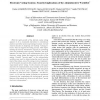Free Online Productivity Tools
i2Speak
i2Symbol
i2OCR
iTex2Img
iWeb2Print
iWeb2Shot
i2Type
iPdf2Split
iPdf2Merge
i2Bopomofo
i2Arabic
i2Style
i2Image
i2PDF
iLatex2Rtf
Sci2ools
110
click to vote
DEXAW
2003
IEEE
2003
IEEE
Electronic Voting Systems: Security Implications of the Administrative Workflow
With the rapid growth of the Internet, online voting appears to be a reasonable alternative to conventional elections and other opinion expressing processes. Current research focuses on designing and building “voting protocols” that can support the voting process, while implementing the security mechanisms required for preventing fraud and protecting voter's privacy. However, not much attention has been paid to the administrative part of an electronic voting system that supports the actors of the system. Possible “security gaps” in the administrative workflow may result in deteriorating the overall security level of the system, even if the voting protocol implemented by the system succeeds to fully comply with the security requirements set for voting. To this direction, this paper describes the responsibilities and privileges of the actors involved in the electronic voting process. The description of the role of each actor, together with the clear indication of what each ...
| Added | 04 Jul 2010 |
| Updated | 04 Jul 2010 |
| Type | Conference |
| Year | 2003 |
| Where | DEXAW |
| Authors | Costas Lambrinoudakis, Spyros Kokolakis, Maria Karyda, Vassilis Tsoumas, Dimitris Gritzalis, Sokratis K. Katsikas |
Comments (0)

